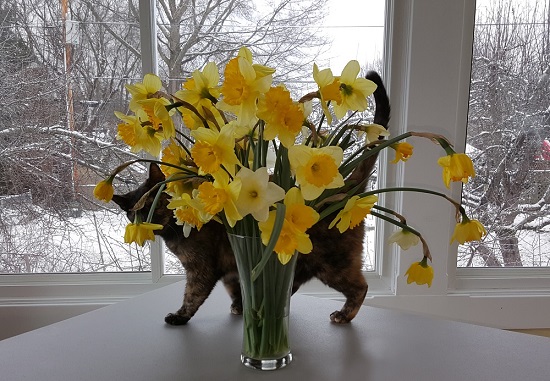In lockdown, I am finding much of what I used to turn to for solace inadequate.
- My cohabitants are themselves first and my cohabitants second. For the sake of all of us, each of us needs to tend our own needs and wants first.
- Others important to me are absent, stressed, and intermittently available.
- Going places and doing things, with and without others, is off the table.
- Conversing through videoconferencing with its amazing motion picture 2D-ness also tantalizes with its absence of 3D.
- Exercising at home, alone, without equipment, is inherently limited. Gyms were invented for a reason.
- Eating, while pleasurable in the moment, also invokes a sense of dread. Stress-based eating and non-eating, plus stress-based food choices, all paired with inadequate motion? I sense I’m setting my own health-related timebomb.
- Using substances does alter my experience of lockdown. However, unskilled, repeated use and overuse can transform unconsciously into inability to limit or stop using. That form of lockdown is one I never want again in my life, however short or long. Only planned, skilled use can occur, including my use of the drug caffeine.
- Entertaining myself with screentime has lost nearly 99% of its appeal.
- Goal-setting and plan-making seem futile in the midst of such uncertainty, yet winging it in the short-term no longer is working.
- Sayings like “This too shall pass” don’t account for an unprecedented “this” and are based on the unfounded belief that things will return to normal and we will get our old lives back. Social protocols have changed and so will our lives and relationships.
- Turning to literature, whether inspirational, literary, or scientific, produces frustration. “Yes, but,” I say to all of them, “that doesn’t cover this.” Apparently the last person who really wrote about what’s going down is Samuel Pepys in 1666.

If I’m going to make it through this, I’m going to have to cobble together a credo, a manifesto, and an operating manual, all in one.
I’m going to call forth wisdom from my father, my own counseling knowledge – particularly decastaphrophizing using the worst case scenario – my clients who have been incarcerated, and the founder of dialectical behavior therapy, Marsha Linehan. I’m calling forth the bravery of those who wrote for us: Anne Frank, Nina Kosterina, Elie Wiesel, Primo Levi, Viktor Frankl, and survivors of the Warsaw Ghetto.
I am going to optimize within constraints while doing time, based on my values and in line with my priorities, all the while knowing opposites may both be true.
Optimize within constraints.
When my father explained the concept of optimizing with constraints to me, he described himself in a hypothetical jail cell, raging at the bars that confined him. He then shifted his attention to the bars, noted the facts of their strength, and acknowledged his confinement. Then he looked around the cell and asked himself what he could do, based on his values, to maximize and optimize his progress towards achieving his objectives.
Acknowledge my worst case scenario.
To my father’s metaphor, I would add decreasing the size of the cell by six inches all around by one’s conception of the worst case scenario. As of this writing, the worst case scenario for me – my greatest fear – is that lockdown will occur indefinitely, that a life sentence in confinement will be my fate. Science predicts that is unlikely but I acknowledge and honor my greatest fear just the same.
Avoidance of what’s bothering me, while seemingly self-merciful, heightens distress in the long-term. Approaching what is real to me – including fears that may be unfounded – even though causing distress in the short-term, is actually an act of self-kindness that increase my endurance for the long run.
Acknowledge the extents and limits of what can be accomplished while doing time.
On behalf of clients who were about to go to jail or prison, I have asked clients who have been to jail or prison to offer their guidance.
This WikiHow guide elaborates, but this is the essence of their hard-won wisdom:
- Do you, not others.
- Get fit.
- Learn something new on the way to where you want to go.
Finish unfinished business.
No matter how much I wish this were not true, I need to:
- get my affairs in order,
- have conversations with people important to me about the location of important documents, their wishes and mine,
- write letters of appreciation to people important to me while there’s still time,
- acknowledge the grief I have now, and plan to grieve the loss of people important to me, given the achingly high numbers of what’s ahead for us.
Remind myself of my values and rank order them.
This Personal Values Card Sort asks me to become aware of what values are “very important to me,” “important to me,” and “not important to me,” then to rank order the values in the “very important to me” category.
Remind myself of my priorities and rank order them.
I can write my priorities on slips of paper, then arrange them on a table in categories of “right now,” “soon,” and “later.” (“Unfinished business” may need a category as well.) I can rank order my priorities in each category. Then I can, with regret, remove the slips representing priorities that are impossible to achieve in lockdown. What remains can help me decide what to do next with the time ahead.
Bravely approach opposites that are both true.
I want parents and partners and leaders to do the job of loving me, comforting me, helping me, and immediately taking over what becomes so hard for me AND I am the only adult on this job.
In lieu of parents, partners, and leaders, I wish I could find a formula to serve in their places for doing all this AND life is dynamic and complex and so must be my strategies.
I am benefiting from what being home offers AND I am losing out on what being in the world offers.
I will make decisions now that will prove both helpful and harmful AND I am consciously making the best decisions I can with all my heart, all my mind, and all the knowledge I can bring to bear on this as often as I can.
I am intermittently made insane by my cohabitants AND I am intermittently kept sane by my cohabitants.
I have too many cats to care for during a lockdown in a pandemic AND I treasure every single moment spent with every single kitty.
I am uncertain how to help others – like the man with whom I have crossed paths in my hometown for years asking me for money to buy food in the grocery store parking lot (I am haunted by the look in his eyes) – AND I am aware that it is the wolf pack that survives, not the mythological lone wolf who dies sooner rather than later, riddled with parasites, doomed to survive on carrion because he can’t bring down fresh game on his own. I must keep aware of ways to respectfully, skillfully, and effectively assist my pack.
I am afraid of what will happen to me AND right here, right now, I am safe.
I am trapped in these four walls with issues I have avoided, I may panic, AND I am free to learn skills to finally approach what has been present with me for a long time.
I am uncertain what the future holds for me, my finances, people I care about, people I don’t even know, and our world AND I am aware that I am actually used to living with uncertainty. Certainty is always an illusion because humans – however much they wish or believe otherwise – cannot predict or control what happens next.
I treasure my ability to think, the greatest gift of being human – which includes the ability to think worried, painful thoughts about the future – AND I can shift my attention to thoughts that are helpful to me right here, right now. (As Agnes Callard writes, “There’s no reason to add an additional harm to whatever evils have already taken place.”)
I am tempted to blame myself and others for a pandemic AND biology happens, species are impacted by other species, and these are occurrences without meaning.
I have loved the beings who have been in my life, the places I have lived, the possessions I have owned AND I love best and most the presence and company of my own consciousness.
Deprivation is present now. Unknown magnitudes of illness, death, loss, and grief are ahead. These have power over me AND I have power to intend to mitigate the effect of hardships. I can use awareness skills to help me through all feelings, all thoughts, all happenings. I may hurt at times and I may struggle at times but external conditions do not define my intentions nor control my inner state.
I love my own consciousness too much to let what’s happening happen to it, too.
I dedicate this post to Jay Wiley, a former student and current resident of New York, who invited me to sing a bit of this tune for his video. May this not be the last video footage of me but, if it is, it’s the best of me. I was laughing, singing, moving in time with someone else, all for a student. I have lived a perfect, precious life.
On a lighter note, here are the outtakes.
The views expressed are mine alone and do not necessarily reflect the positions of my colleagues, clients, family members, or friends. This content is for informational purposes only and is not a substitute for medical or professional advice. Consult a qualified health care professional for personalized medical and professional advice.




